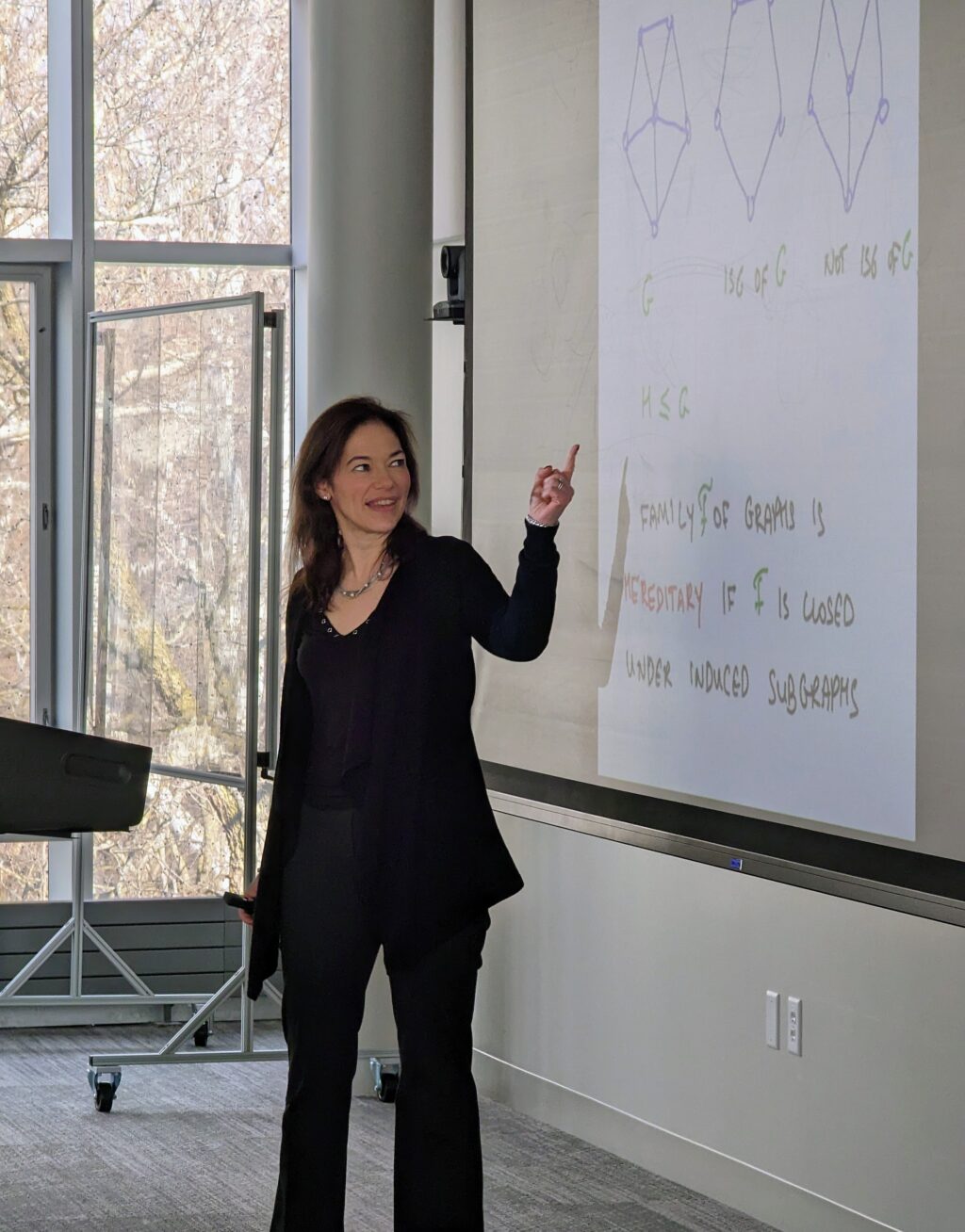Fields-Carleton Distinguished Lecture
The Fields-Carleton Distinguished Lecture is an annual lecture sponsored by the Fields Institute for Research in Mathematical Sciences and Carleton University. The series features internationally-renowned speakers with expertise in mathematics, statistics, computer science, or a related area. Each guest speaker delivers a public lecture as well as a research lecture, which is more technical in nature.
2025 Fields-Carleton Distinguished Lecture

Speaker: Dr. Maria Chudnovsky
Mathematics Department, Princeton University
2025 Fields-Carleton Distinguished (Public) Lecture
Topic: What Makes a Problem Hard?
Thursday, October 16, 2025
Health Sciences Building, Room 1301 (7:00 to 8:00PM)
Carleton University
Graph theory is a powerful mathematical tool for modeling real life situations. But once the model is built, how useful is it for finding a solution? The answer depends on how complicated the graph we have constructed is. What makes a graph complicated and when is finding a solution difficult?
There are many possible answers to this question; in this talk we will discuss some of them. We will start with a brief overview of the history of the subject. No prior knowledge of graph theory is assumed.
2025 Fields-Carleton Public Lecture Registration
Personal information collected through this form will be used and disclosed by Carleton University under the authority of the Carleton University Act, and in accordance with sections 39, 41 and 42 of Ontario’s Freedom of Information and Protection of Privacy Act. The purpose of this processing is for advancement activities and alumni development purposes. If you have any questions about the processing of personal information by Carleton University, please contact the Manager, Privacy & Access to Information, by phone at 613-520-2600 ext. 2047 or by e-mail via University_Privacy_Office@carleton.ca. You may also visit carleton.ca/privacy for additional information and notices.
2025 Fields-Carleton Distinguished (Specialized) Lecture
Topic: Tree Decompositions: Representing a Graph by a Tree
Friday, October 17, 2025
Herzberg Laboratories, Room 5345 (11:00 to 12:00 PM)
Carleton University
How does one describe the structure of a graph? What is a good way to measure how complicated a given graph is? Tree decompositions are a powerful tool in structural graph theory, designed to address these questions.
To obtain a tree decomposition of a graph G, we break G into parts that interact with each other in a simple (“tree-like”) manner. But what properties do the parts need to have in order for the decomposition to be meaningful?
Traditionally a parameter called the “width” of a decomposition was considered, that is simply the maximum size of a part. In recent years other ways of measuring the complexity of tree decompositions have been proposed, and their properties are being studied. In this talk we will discuss recent progress in this area, touching on the classical notion of bounded tree-width, concepts of more structural flavor, and the interactions between them.
2025 Fields-Carleton Specialized Lecture Registration
Personal information collected through this form will be used and disclosed by Carleton University under the authority of the Carleton University Act, and in accordance with sections 39, 41 and 42 of Ontario’s Freedom of Information and Protection of Privacy Act. The purpose of this processing is for advancement activities and alumni development purposes. If you have any questions about the processing of personal information by Carleton University, please contact the Manager, Privacy & Access to Information, by phone at 613-520-2600 ext. 2047 or by e-mail via University_Privacy_Office@carleton.ca. You may also visit carleton.ca/privacy for additional information and notices.
Past Fields-Carleton Distinguished Lecture Speakers
Dr. Donna Strickland, University of Waterloo
Leon Glass, McGill University
Charmaine B. Dean, University of Waterloo
Gang Tian, Peking University
Uffe Haagerup, University of Copenhagen
Thomas C. Hales, University of Pittsburgh
Kenneth R. Davidson, University of Waterloo
Donald Dawson, Carleton University
V. Kumar Murty, University of Toronto
Philippe Flajolet, INRIA
Jerrold Marsden, California Institute of Technology
Donald Saari, University of California, Irvine